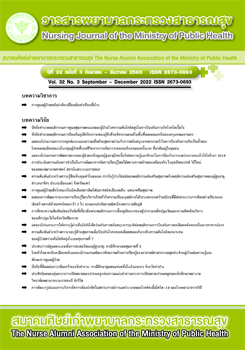Factors Related to Positive Parenting Behaviors and Executive Function in Preschool-age Children, Chiang Rai Province
Main Article Content
Abstract
This descriptive correlational study aimed to examine positive parenting behaviors, executive functions, and the relationships among personal factors, social support, and perceived benefits of positive parenting on positive parenting behaviors and executive functions in preschool-age children. A multi-stage sampling technique was used to recruit 155 parents of children who attended a child development center under the local government. Data were collected using questionnaires on general information, social support, benefits of positive parenting, and the Positive Parenting Scale: Parent version. Descriptive statistics and Pearson correlation statistics were used to analyze the data. The results revealed that the parents displayed a positive parenting behavior at a high level. The factors that positively correlated with positive parenting behavior were education level, social support, and perceived benefits of positive parenting (r=.18, p<.05, r=.35, p<.01 and r=.40, p<.01, respectively). Executive function for preschool-age children displayed a moderate level. The factors that positively correlated with positive parenting were social support and perceived benefits of positive parenting (r=.28, p<.01 and r=.34, p<.01, respectively). Therefore, healthcare providers should pay more attention to promote positive parenting behavior and to develop executive function for preschool-age children.
Article Details

This work is licensed under a Creative Commons Attribution-NonCommercial-NoDerivatives 4.0 International License.
บทความและรายงานวิจัยในวารสารพยาบาลกระทรวงสาธารณสุข เป็นความคิดเห็นของ ผู้เขียน มิใช่ของคณะผู้จัดทำ และมิใช่ความรับผิดชอบของสมาคมศิษย์เก่าพยาบาลกระทรวงสาธารณสุข ซึ่งสามารถนำไปอ้างอิงได้
References
Phongphetdit B, Authawee B. Factors affecting the development of early childhood Thailand: Public health region 5. KJN. 2020;27(1):59-70.(in Thai)
The Royal College of Pediatricians of Thailand. Handbook for parents to disseminate knowledge and development of childcare: Early childhood 3-6 years. Bangkok: The Royal College of Pediatricians of Thailand & Pediatric Society of Thailand;2017.(in Thai)
Thai Health Promotion Foundation, Raklukegroup. Brain skills development guide: EF executive function for primary school teacher. Bangkok: Matichon public comany limited;2018.(in Thai)
Thai Health Resource Center. Positive parenting. Bangkok: Rakluke Human & Social Innovation Company Limited;2020.(in Thai)
Chano J. Executive functions and early childhood development. JOE, MSU.2019;13(1):7-17.(in Thai)
Bolsoni-Silva AT, Loureiro SR. Behavioral problems and their relationship to maternal depression, marital relationships, social skills and parenting. Psicologia: Reflexão e Crítica volume 2020;33(22):1-13. doi:10.1186/s41155-020-00160-x.
Hughes C, Devine RT. For better or for worse? positive and negative parental influences on young children’s executive function. Child Dev.2019 Mar;90(2):593-609.doi:10.1111/cdev.12915.
Seamkhumhom D, Chaiyawut P, Wanngamwiset S, Thienphuridej T. Promoting to executive function in preschool children. JMND.2020;7(10):15-31.(in Thai)
Chutabhakdikul N, Thanasetkorn P, Lertawasdatrakul O. Tool development and evaluation criteria for assessment of executive function in early childhood. Bangkok: Research Center for Neuroscience, Mahidol University;2017.(in Thai)
Seamkhumhom D, Nookong A, Rungamornrat S, Chutabhakdikul N. Factors related to executive functions in preschool-aged children. JTNMC.2019;34(4):80-94.(in Thai)
Hayes JF, Eichen DM, Barch DM, Wilfley DE. Executive function in childhood obesity: promising intervention strategies to optimize treatment outcomes. Appetite.2018;124:10-23.doi:10.1016/j.appet. 2017.05.040.
Lecce S, Bianco F, Devine RT, C. H. Relations between theory of mind and executive function in middle childhood: a short-term longitudinal study. J Exp Child Psychol.2017;163:6986.doi:10.1016/j. jecp.2017.06.011.
Stenason L, Moorman J, Romano E. The experiences of parents and facilitators in a positive parenting program. Qual Rep.2020;25(1):1-13.doi:10.46743/2160-3715/2020.3738.
Sanders M. Harnessing the power of positive parenting to promote wellbeing of children, parents and communities over a lifetime. Behav Change.2019;36:56-74.doi:10.1017/bec.2019.3.
Pornnoppadol C. Positive Parenting Scale: Parent version (POPS-P). Bangkok: Faculty of Medicine Siriraj Hospital,Mahidol University;2020.(in Thai)
Khumtorn L, Suwanvela S. The relationship between social support and life skills among nursing students in Boromarajonani College of Nursing, Trang. JHSS.2018;14(1):54-66. 17. Rosenstock, IM.(1974). The health belief model and preventive health behavior. Health Education
Monographs,2(4):328-35.

